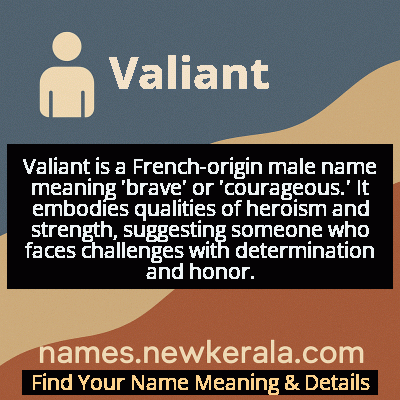Valiant Name Meaning & Details
Origin, Popularity, Numerology Analysis & Name Meaning of Valiant
Discover the origin, meaning, and cultural significance of the name VALIANT. Delve into its historical roots and explore the lasting impact it has had on communities and traditions.
Name
Valiant
Gender
Male
Origin
French
Lucky Number
7
Meaning of the Name - Valiant
Valiant is a French-origin male name meaning 'brave' or 'courageous.' It embodies qualities of heroism and strength, suggesting someone who faces challenges with determination and honor.
Valiant - Complete Numerology Analysis
Your Numerology Number
Based on Pythagorean Numerology System
Ruling Planet
Neptune (Ketu)
Positive Nature
Intuitive, analytical, spiritual, and inquisitive.
Negative Traits
Secretive, reserved, aloof, and can be overly critical.
Lucky Colours
Green, yellow.
Lucky Days
Monday.
Lucky Stones
Cat’s eye, moonstone.
Harmony Numbers
1, 5, 6.
Best Suited Professions
Scientists, researchers, spiritual leaders, detectives.
What People Like About You
Depth of knowledge, analytical skills, spirituality.
Famous People Named Valiant
Valiant Thor
Alleged extraterrestrial visitor
Central figure in UFO mythology who allegedly visited the Pentagon in 1957
Valiant Comics Characters
Fictional superheroes
Iconic characters from Valiant Entertainment comic universe
Valiant Swart
South African musician
Award-winning Afrikaans singer and songwriter
Name Variations & International Equivalents
Click on blue names to explore their detailed meanings. Gray names with will be available soon.
Cultural & Historical Significance
The name's French origins connect it to the courtly traditions of medieval France, where valor was considered essential for nobility and leadership. In heraldry, the concept of valor was often symbolized by lions and other fierce creatures, further cementing the name's association with courage and strength in Western cultural consciousness. During the Renaissance, the ideal of the 'valiant man' evolved to include intellectual and moral courage alongside physical bravery, reflecting humanist values that emphasized comprehensive personal excellence.
Extended Personality Analysis
Individuals named Valiant are typically perceived as possessing strong leadership qualities, unwavering courage, and a natural inclination toward protecting others. They often exhibit a charismatic presence that inspires confidence in those around them, combined with a strong moral compass that guides their decisions. Valiants tend to be action-oriented problem-solvers who face challenges head-on rather than avoiding difficult situations. Their bravery extends beyond physical courage to include moral fortitude - they're willing to stand up for their principles even when it's unpopular.
While they can be perceived as intense or serious, they often balance this with a protective warmth toward loved ones and a deep sense of loyalty. The name suggests someone who approaches life with determination and resilience, viewing obstacles as opportunities to demonstrate their strength of character rather than as barriers to success. People with this name are often drawn to roles where they can make a difference, whether in leadership positions, protective services, or advocacy work, driven by an innate desire to create positive change through courageous action.
Modern Usage & Popularity
In contemporary times, Valiant remains an uncommon but powerful choice for parents seeking a name with strong heroic connotations. While not ranking among the top 1000 names in most English-speaking countries, it has seen occasional usage particularly among families with military backgrounds or those drawn to virtue names. The name enjoys some popularity in fantasy and gaming communities, where its epic quality resonates with enthusiasts of heroic narratives. Modern usage often positions Valiant as a distinctive alternative to more common virtue names like Victor or Valor, appealing to parents who want their child's name to embody courage and strength of character. The name's rarity makes it memorable while its clear meaning provides immediate positive associations, though some parents may hesitate due to its strong, almost theatrical quality that could create high expectations for the child.
Symbolic & Spiritual Meanings
Symbolically, Valiant represents the human capacity for courage in the face of adversity, embodying the archetype of the hero who confronts danger for noble purposes. The name carries connotations of moral and physical bravery, suggesting someone who not only faces external threats but also maintains integrity under pressure. In symbolic terms, Valiant connects to the lion in heraldry - a creature traditionally representing courage, royalty, and martial prowess. It also symbolizes the warrior spirit tempered by honor, suggesting that true valor involves using strength for protection rather than aggression. The name evokes images of medieval knights, mythological heroes, and all who demonstrate exceptional courage while serving higher principles, making it a powerful symbolic choice representing the triumph of courage over fear and the human aspiration toward noble action in challenging circumstances.

